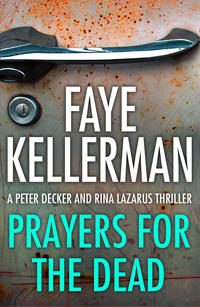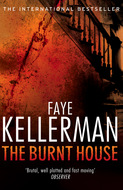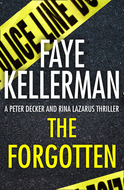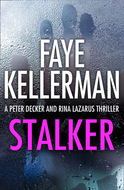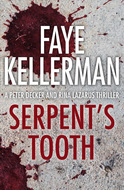Kitap dosya olarak indirilemez ancak uygulamamız üzerinden veya online olarak web sitemizden okunabilir.
Kitabı oku: «Prayers for the Dead», sayfa 2
 2
2
Tracadero’s was one of the few hoo-hah, nouvelle, chic, posh, pick-your-own-effete-adjective restaurants in the West Valley. Translation to Decker: Pay a lot for tiny portions. He had been there once. The inside had been done up to look like scaffolding. For that kind of money and atmosphere, he could have just as easily bag-lunched it at a construction site. The place was located midblock in a commercial strip of street.
A long block. As Decker fast-walked through a decently lit back alley, he noticed a pizzeria, a clothing boutique, a guitar store, a pharmacy, a hair and nail salon, and a tropical fish store. The night was foggy and cool, the glare of starlight spread behind a wall of filmy clouds. Yellow crime tape had been stretched across the alley’s main entrances, two black-and-whites nose to nose at the driveways, preventing pass-through traffic. As he came closer to the actual crime spot, the crowd grew dense. Uniformed and plainclothed officers swarming around a bronze Buick. The strong odor of garbage mixed with the metallic stench of fresh blood and excreted bowels.
Marge and Oliver had already arrived. So had Martinez and Webster, the newest imports to Devonshire Homicide. Bert Martinez came from Van Nuys Substation, having worked Crimes Against Persons detail, Tom Webster was a transplant from Mississippi with ten years of gold-shield experience and a BA in music composition from Tulane. With veteran Farrell Gaynor, they would comprise the team for this case, as major homicides were usually worked in groups of five. Gaynor was on his way, his wife having reported that he had just left. The old man moved like a slug, but had a microscopic eye for details and patience for paperwork.
Decker reached inside his jacket, slipped on a pair of latex gloves. Marge noticed him first, pushed silk blond hair out of her brown doe eyes and gave a wave. She was a big woman, five nine plus, large-boned and all muscle. Unmarried as well. Not too many guys could compete against her in either the brains or brawn department. The others gave him nods as he approached their huddle.
First thing up: Clear unnecessary people. Decker said, “Martinez, Oliver, Webster, and Dunn. You stay here. How many cruisers were sent here? Anyone know?”
“Seven,” someone answered.
“Four of them are blocking the entrances to the alley.” Decker thought a moment. “All right, the other three loose black-and-whites, start making passes around the area. Use extreme caution if you see anything suspicious. And always call for backup. The rest of you, go back to the barricades and wait for further instructions. On your way out, don’t touch anything, watch where you step. Go.”
Slowly, the crowd scattered, leaving Decker full view of the car. The driver’s door was still wide open, legs protruded out, shoes scraped the asphalt. Good shoes. Quality black leather, maybe Ballys or Cole-Haan. They were splattered with sticky clots of blood. Decker advanced, peered inside the car.
An abattoir. Jackson Pollock in shades of red and brown. He held his breath and exhaled carefully, thankful his stomach was empty. Stab wounds had turned the doctor’s chest into a sieve, bullets had pierced through the great man’s head and neck. Carefully, he touched the cheek.
“Body’s still warm.” Decker looked at his glove. Wet with blood. He’d have to change it before he touched anything else. He checked his watch. Nine-twenty. “Anyone call up the ME?”
“Yo.” Oliver ran his hands through a mound of dark hair. His brown eyes flitted through the scene. “Called the coroner’s office, called Forensics as well. They should be here any moment.”
“What about Captain Strapp?”
Marge said, “I left a message for him, Pete … er, Loo.”
Oliver flashed Marge a white, toothy smile. She ignored it and him. Pity because Scott was well built and good-looking. He even had moments that could be roughly defined as charming. Just too few of them and way too far between.
Out of the corner of his eye, Decker saw a stoop-shouldered man wrapped in a cardigan sweater, inching toward them. Marge followed Decker’s stare, shook her head. “I think you woke him up from his nap.”
Decker waved Gaynor forward. The man attempted a trot but gave up. His belly was too big, his legs too spindly to carry that much weight while running. Oliver said, “I thought he retired. He should be retired.”
“C’mon,” Martinez whispered impatiently. He twirled the ends of his Brillo mustache. “Guy’s an antique. Don’t know why the department keeps him on. He doesn’t even help it out with affirmative action.”
Oliver said, “You know, this team would fail even the most liberal affirmative action qualifications. Too many white males. Not enough minorities. No blacks, Indians, Asians, women—”
Marge said, “Uh, excuse me—”
“Hispanics—”
“A-hem,” Martinez broke in.
“No deaf-blind paraplegics, no midget cretins, no mentally deranged or morally handicapped—”
“Look in the mirror, Scott,” Marge said.
Oliver said, “I don’t know where you fit in, Webster. Man, they don’t make ’em any WASPier.”
“Enough, Scott,” Marge said. But he did have a point. Tom was Mr. Perma-Prest with his perfect chip of blond hair falling in front of sleepy, bluebell eyes. Most detectives exuded an excitement when starting a case. Webster seemed injected with ennui, as if forced to put up with another hot and humid August day in Biloxi, Mississippi.
Oliver went on. “Actually, you’re more than WASP, Tommy Boy. You are down-home DWM.”
“Beg your pardon?” Webster drawled.
“Dead White Male,” Marge said.
“Don’t hate me ’cause ahm beautiful,” Webster said dryly.
Oliver smiled, started whistling “Here Comes Santa Claus” as Gaynor arrived, sweaty and winded.
“Hey, gentlemen.” Farrell looked at Marge. “And ladies.”
Oliver said, “We were all wondering why the department hasn’t put you to pasture since you don’t help them with affirmative action.”
Gaynor said, “I’m elderly. Gray power.” He held his fist in the air. “God, it smells awful.”
“It is awful,” Marge said.
“Take a look for yourself, Farrell,” Oliver stated. “If your heart can take it.”
“Old ticker’s stronger than you’d think.” Gaynor walked over to the car, looked inside, and winced. He slipped on gloves. “Gruesome. It’s definitely the primary crime scene.”
“I can see why they keep you on,” Oliver said. “Astute powers of observation.”
Decker said, “Sparks worked exclusively with New Christian Hospital, didn’t he?”
Gaynor said, “I know he was there a lot. Friend of mine used Sparks a couple of years ago for bypass surgery. It was done at New Chris.” He smiled benignly at Oliver. “One day you’ll know from these things.”
Oliver gave him a sick smile.
Decker said, “He must have had his office there, right?”
Blank stares. Gaynor said, “When I had my angiogram done, it was a hospital procedure. But my doctor had a regular office.” He thought a moment. “But he was a cardiologist not a surgeon.”
Decker said, “Dunn, find out where Sparks saw his patients when he wasn’t operating. In any event, I want you and Oliver to go over to New Chris, see if Sparks was coming from the hospital. While you’re on your way, make calls and find out who Sparks’s secretary is. If he kept his office at the hospital, tell the secretary to meet you there. I want to get hold of Sparks’s daily planner. Hopefully, nobody lifted it.”
“Got it,” Oliver said. “I’ll interview all the nurses personally. One by one. In private.”
Decker stared into space. “Parked in a back alley like this … Sparks wasn’t sightseeing. So what was he doing here?”
“Parking the car for the restaurant,” Martinez suggested.
“Then why wouldn’t he have used the valet up in front?”
“He was cheap,” Oliver said. “Lots of rich people are.”
“Or it was a carjacking,” Webster added.
Decker didn’t buy it. A carjacker wouldn’t make his drop in back of a populated restaurant. His eyes traveled back to the car, scanned the corpse. The scene hadn’t gotten any less horrifying. “Could be someone lured Sparks here. Let’s get a time frame for him. Try to reconstruct his day. Go back to New Chris and talk to anyone who saw him. Call me in a half hour for an update. Go.”
Marge and Oliver looked at each other. Oliver said, “You drive?”
“I’ll drive.”
Oliver flipped her the keys, and they left.
Decker said, “Anyone talk to the valet yet?”
Martinez said no. “Guy’s Hispanic. Want me to do it?”
“Yes. Find out if he heard or saw anything. Also the kitchen faces the back alley. Maybe the help heard something.”
“Si, si, Señor Wences.”
Decker turned to Webster. “You canvass the block?”
“It’s all stores, Loo,” Martinez said. “Everything’s shut down at this hour.”
“How about someone working late in one of the back rooms?” Webster said. “Some soul mighta heard something going down.”
Decker agreed. “Canvass the block. On your way back, Tom, check all the alley Dumpsters. We’ve got a gunshot wound, maybe we’ll find a gun. We’ve got multiple stab wounds, maybe someone chucked a bloody knife.”
Webster said, “Odd, Loo. We got gunshot and stab wounds.”
“Very.”
“Suggestive of more than one person?”
“Indeed.” Decker looked around. “This much blood spatter … maybe we’ll find more than one shoe print.”
Martinez said, “Or a bloody glove.”
“Man, you jest but somewhere there is a pile of bloody clothing begging to be tagged and filed. Be careful. And before you pick up anything to bag it, snap a picture. Anyone have a camera?”
“I got a thirty-five millimeter in my car,” Martinez said.
“Good,” Decker said. “If you got enough film, Bert, take a few pictures of the body for me.”
“Will do.”
“Y’always carry a camera, Bert?” Webster asked.
“The missus keeps one in the cars for spontaneous family shots,” Martinez answered. “I think I’ve got half a roll left over from our Labor Day picnic.”
Webster said, “Might be a good idea if you took that one in for developing, Bert. Separate the postmortems of Sparks from the family snapshots.”
“A very good idea,” Decker concurred. “Everyone be sure to cover your butt. It plays well on prime time.”
Martinez said, “Speaking of prime time, Loo, look who’s coming our way.”
Decker’s eyes strained in the darkness. Strapp with camera crews in tow.
“I’ll handle it.”
“Then we’re dismissed?” Webster said.
“Unless you want to talk to Strapp.”
Martinez waved good-bye. He and Webster headed down the alley, jogging away from Strapp.
Decker turned to Gaynor. “You stay here at the scene, wait for the ME and Forensics. Make sure no one … and I mean no one … screws up evidence. You watch them, Farrell, stand over their shoulders and direct if necessary. No screwups. Not while I’m in charge.”
“Where are you going, Loo?”
“I’m going to satisfy Strapp, and hopefully deflect the media. Get the field clear so my detectives can do their jobs. Then, I’m going to notify next of kin.”
Gaynor patted his back. “Brave man.”
Decker felt sick inside. “Someone has to take out the garbage.”
 3
3
As the captain advanced with the television army, Decker held up his index finger indicating a minute. Strapp held out an open palm, telling the media troops to halt, and said something to a coiffed brunette in a teal-blue silk pants suit. She placed her hands on her hips, and shook her head defiantly. Strapp was not impressed and shot back a response, his face hard, his shoulders stiff. The brunette looked upward, threw up her hands, then went back to her underlings. Strapp approached Decker by himself. Gaynor stood back to guard the body, happy to be out of the picture.
Because the Captain was a formidable man. He was of average height—a lean man with lean features. But his eyes were knowing, intense. Strapp was a clear thinker and a good problem solver. Deliberate, almost cagy at times. Decker had trouble reading him. So far, the Cap seemed to be a man of his word.
Strapp said, “Fill me in.”
“I just arrived around fifteen minutes ago.” Decker smoothed his mustache. “I’ve sent Martinez in to interview the restaurant personnel, Webster’s canvassing the block. We’ve got at least three additional patrol cars making passes through the area. Gaynor’s waiting for the ME and Forensics. I’ve assigned Oliver and Dunn over to New Chris where Sparks operated and attended.”
Strapp nodded. “So you know who Azor Sparks is … was.”
“Yes, sir. That’s why I’m here.”
“Any murder is a blow for our community. Shit like this is an effing big, black eye. Whatever you need for this one. Just get it done and get it done quickly.”
“Absolutely.”
“If that means double shifts, then you work double shifts.”
“No problem.” Decker stuck his hands in his pockets, thought of Rina, made a mental note to send her flowers. Better make them roses … long stems.
Strapp said, “You looked at the body?”
“Yes, sir. It’s really bad.”
“Jesus, Decker, who’d want to murder someone like Sparks? He was New Christian Hospital. Without him, the place is going to fold. Because without him, they aren’t going to get the big donors.”
Decker didn’t answer. Though Strapp was thinking like the politician, his assessment was right on. Sparks had put New Chris on the map. A tiny hospital, it had become renowned, mostly because Sparks had turned it into his personal place of business. And the hospital had been a tremendous source of revenue for the West Valley, drawing in lots of philanthropists. There had been quite a bit of dollar overflow into the area, the hospital paying for extracurricular school programs, park programs, health programs, as well as extra community-based fire and police programs. Just six months ago, New Chris donated a dozen of its old computers to the detectives’ squad room.
Strapp said, “Anything you need to solve this sucker quickly, Decker. Whatever manpower it takes just as long as it’s done textbook clean. Has anyone on your team ever had a race or sex problem?”
“Not that I know of,” Decker said. “Scott Oliver does have a mouth. I wouldn’t be surprised if he’s said things.”
“Pull him off.”
“No, I don’t want to do that.”
Strapp’s eyes shot up to Decker’s face. “Why not?”
“Because he’s a good detective. I’ve got him teamed with Dunn. She should keep him clean. Besides, there’s nothing controversial here. Sparks was white.”
“What if his killer was black?”
“Why don’t we take it one step at a time—”
“I’m just saying, I don’t want some A-hole liberal legal eagle making my men out to be monsters. You tell everyone to tread carefully, like we’re handling toxic waste.”
“Agreed.”
“You want to take the media, Decker?”
“Not much to tell them yet. Next of kin hasn’t been notified yet, so we can’t give out any names—”
“Too late. Networks already know who the stiff is.”
Decker was appalled. “How’d that happen?”
“Obviously some jerk slipped over the scanner.”
“Christ!” Decker felt his teeth grind together. “The family doesn’t even know.”
“So get over there and tell them. I’ll hold the media off as long as I can. But you know these guys. They eat a strict no-ethics diet.”
Decker checked his watch. Nine fifty-two. “I’m out of here.”
He sprinted back to his Volare, turned on the engine, and peeled rubber. Sparks had lived about ten minutes away from where someone had made his grave. If speed and luck were with him, he’d make it to the house before the ten o’clock news.
Decker identified himself behind a closed door. As soon as it swung open, he breathed a sigh of relief. Because the expression on the young woman’s face suggested apprehension mixed with ignorance.
She didn’t know.
She was pretty—regular features, peaches-and-cream complexion, grass-green eyes, clean, straight, shoulder-length pecan-colored hair. Appeared to be around twenty, looked like a coed with her body buried in baggy jeans and an oversized sweatshirt. Very wholesome face, wore no makeup or jewelry except for a simple cross around her neck. A disembodied voice came from behind her. “Who’s there, Maggie?”
“It’s the police,” she answered.
“Police?”
Decker said, “Is your mother home, ma’am?”
“She’s rest—”
A young man suddenly appeared. Straggly dark curls falling over his forehead. Bright, nervous blue eyes peering beneath the curtain of tresses. Older than the girl, probably in his midtwenties. He was wrapped in an argyle sweater over a button-down Oxford shirt. His pants were beige chinos, his feet tucked into loafers without socks. “How can I help you?”
Decker’s face remained flat. “I’m Lieutenant Decker from LAPD. Actually, I came to speak with Dolores Sparks.”
The man said, “What do you want with my mother?”
“Is she in, sir? It’s an emergency.”
“Oh my God!” Maggie shrieked. “Is it Dad?”
The young man paled. “My father? Is he okay?”
“May I come in?”
The door opened all the way, and Decker stepped inside a three-story entry, quickly scanned the place. Living room to left, dining room to right, family room straight ahead. It held a set of French doors that opened outward. There were also lots of floor-to-ceiling windows topped with thick valances and tiebacks. Couldn’t make out much of the backyard. At this time of night, it was all fog and shadows.
Decker looked upward. A wrought-iron staircase snaked its way to the top. The house appeared enormous. But the interior, though neat and clean, had seen better days. Peeling wallpaper, scarred wood flooring, chips in the ceiling molding. And old furniture. Thirty years ago, it had been top-notch. But now the upholstery had faded, the pillows were lumpy and lopsided. A spacious house, even in this neighborhood of big homes, though it now sat in genteel neglect.
Decker focused his attention back on the young man with the curly hair and blue eyes.
“Are you Dr. Sparks’s son?”
“One of them. Michael. What’s this about?”
“I really need to speak to your mother.”
Michael stood his ground. “First, tell me what’s going on.” His voice turned shaky. “It’s Dad, isn’t it?”
“Sir, we found a homicide victim about an hour ago. I regret to say that we have reason to believe that it’s your fath—”
“Oh my God!” Maggie put her hands over her mouth. “Oh my God, oh my God, oh my God—”
“Maggie, call Bram.”
“Oh my God! Oh my God—”
Michael grabbed his sister’s shoulders. “Maggie, go to the phone and call Bram now!”
The order shook her out of her mantra. She dashed to the phone. Decker said, “I’m very, very sorry, sir. But I really do need to speak to your mother.”
Michael didn’t move. His skin had become as transparent as onion skin. In gross contrast to his ebony curls.
A soft voice came from above. “Michael, what is it?”
Again, Decker looked upward. A woman stood on the upstairs landing, her silver hair clipped short around a round, full face. She wore a multicolored caftan, her skin heavily flushed. Michael’s knees caved in, but he recovered before he fell.
Decker put a hand on his shoulder. “I’ll handle it.” He started up the steps, but the young man dogged his heels. Before Decker could speak, Michael said, “Mom, I think you should go back to bed.”
“Why?” The woman was tall and stolidly built. Beads of sweat covered her forehead and sprinkled the top of her upper lip. Green eyes like her daughter. Clear, focusing sharply on Decker. “Who are you?”
“Mrs. Sparks, I’m Lieutenant Peter Decker of the Los Angeles Police—”
Michael blurted out, “He’s here about Dad—”
“Something’s wrong, then.” The woman looked squarely at Decker. But her eyes had already moistened. “Is it Azor? A car accident? He works late hours, doesn’t get enough sleep.”
Decker trudged on. “Ma’am, we discovered a homicide victim about an hour ago, and have reason to believe it’s your husband. I’m very, very sorry.”
The eyes continued to peer into his face. Tears went down her cheeks. She shook her head vehemently. “No, no, you’re wrong, then. Very wrong—”
“Ma’am.”
“Go back and check. Because no one would want to hurt Azor. You have to be wrong!”
Michael said, “Mom, maybe you should—”
Tears flowed openly over her ruddy face. “Michael, tell this man he’s wrong. Tell him he made a big mistake.”
“Mom—”
“I’ll call Father right now. Prove he made a mistake.” She stepped forward, then faltered. Decker caught her, kept her upright as she leaned on his strong shoulders. No easy trick. The woman was around five ten and weighed about one seventy. “Where’s her bed?”
“I’ll take her.” Michael gripped his mother soundly. He was slightly taller than her, but his hold was firm. “Let’s go back to bed.”
“Oh, Michael, what happened?”
“I don’t know—”
“Did you call Bram?”
“Right now—”
“Maybe he knows. Bram always knows.”
“Maybe, Mom—”
“Tell him to come right away!”
“I will,” Michael said. “Come on, Mom. You’ve been sick—”
“Just let me phone Father. To tell this man he’s wrong.”
“Mom, he isn’t wrong.”
“But he has to be wrong! It can’t be.”
She started to sob loudly as Michael pulled her into a room. Then the door closed in Decker’s face. Left him standing there, alone and useless. He could make out sounds behind the door—moans, sobs … no words. At these moments, he felt like a Peeping Tom, privy to private grief. Dirty and perverted. He could never understand why people watched talk shows. Why see people at their worst?
He exhaled slowly, hoping Dolores Sparks would have enough emotional and physical strength to make it through the night. He would have liked to have questioned her, asked her what her husband had been doing, parked in the back alley behind Tracadero’s … asked her about Sparks’s daily habits. But nothing would have sunk in right now because the woman was still in denial. Perhaps when the shock wasn’t as overwhelming, they could talk. Tomorrow, he would try again.
No sense standing around, so he went downstairs. Maggie was shaking, a phone receiver in her right hand. She turned to Decker, her cheeks soaked with tears. “He’s not in. What should I do?”
“Why don’t you sit down, Maggie. Is there a doctor I can call? Maybe a close family friend of your mother’s?”
Michael came running down the stairs. “She’s asking for Bram, Mag. Is that him?”
“He’s not home! I called his apartment three times and just got the machine!”
“You called his apartment?” Michael sighed. “Maggie, you should have called the church!”
“Oh God, what’s the num—auto dial one, right?” She held the receiver to her ear.
Michael began to pace. To Decker, he said, “I gave her a sedative … to calm her down.” He rubbed his face, continued to pace.
Maggie shouted into the receiver. “Bram, if you’re there, pick up the phone! This is an emergen … Hello? It’s Maggie Sparks, can you please get my broth—”
Michael grabbed the phone away from her. “Get my brother on the phone, now. This is an emergency!” To Maggie, he said, “Go upstairs and look after Mom. And try not to be so hysterical!”
Maggie dashed up the steps.
Michael yelled into the mouthpiece. “You’ve got to get over here quick! There’s been a terrible …” Tears exploded from Michael’s eyes. “Police are here, Bram. Dad’s been murdered.”
Decker could hear a voice over the line saying, “Oh my God!”
Michael said, “You’ll come over?”
Another pause. Michael saying, “She’s in the bedroom with Maggie. I gave her a sedative … No … not yet. Can you call them? I can’t … no … no … no … he said he thought it was Dad, but I’m not sure … Look, why don’t you talk to him.” He shoved the phone in Decker’s face, and resumed pacing.
Decker said, “This is Lieutenant Peter Decker. To whom am I talking, please?”
A beat. Then a soft voice said, “I’m Dr. Sparks’s son Abram. What happened?”
The voice was calm, especially when compared to the surrounding hysteria. Decker said, “It would be better if we talked in person.”
“How’s my mother?”
“Resting. Your brother gave her a sedative. Is that all right?”
“Yes, that’s all right. My brother said my father was murdered. Is this true?”
“Yes, sir, that appears to be the situation. I’m very sorry.”
“Are you sure it’s him? Has someone identified him?”
“His personal identification was on him—his license, his credit cards, his professional cards. Besides, your father is a recognizable person in this community.”
“I want to see him.”
“I’d be happy to escort you to make an identification.”
“Tell me where to go.”
“I’m sorry but I’ll have to escort you. Anything I can do to help you and your family through this terrible crisis.”
Another beat. “I’m so stunned, I don’t … May I please talk to my brother again?”
Decker noticed he said “may” instead of “can.” Shaken but in control. “Of course.” He handed the phone back to Michael.
“When are you going to get here?” Michael barked into the phone.
“I’m going down … to make sure it’s Dad,” Bram answered. “Someone has to call the others.”
“Can you do it? Maggie’s useless and I’m … I can’t handle Paul right now.”
“All right. I’ll do it.”
“When are you going to get here? Mom’s asking for you.”
“As soon as I can, Michael. Where’s Maggie?”
“With Mom.”
“Mike, watch Mom like a hawk. Keep her away from the medicine cabinet.”
“Right.”
“Also, get Maggie to take her Theo-Dur—”
“She seems okay—”
“As a precaution, Mike. Her attacks are usually delayed. I can’t deal with Maggie’s asthma right now. Tell Mag to lie down and rest until I can get there.”
Michael nodded.
“Are you there?”
“Sorry, yes. I’ll keep watch over Mom.”
“And Maggie, too. Take care of both of them. Are you getting this down, Michael?”
“Yes, keep watch over Mom. And Maggie, too. Just get here.”
“As soon as I can. Put Decker back on.”
“Who?”
“The lieutenant.”
“Oh …” Again, Michael gave the phone to Decker.
“Yes?”
Bram said, “Do you know where the Church of St. Thomas is, Lieutenant?”
“Of course.”
“How far is it from where my father …”
“I could meet you at St. Thomas’s if you’d like, Mr. Sparks.”
“Thank you very much. I’d appreciate it. I need to call my other siblings. To tell them what’s going on. I’ll meet you outside the church in twenty minutes.”
“That’s fine.”
The phone disconnected.
Michael said, “Is he coming over?”
“No,” Decker said. “First he wants to identify your father. I’m picking him up in front of St. Thomas’s.”
“God …” Michael paced furiously. “I hope he gets here quick. I don’t think I can handle the others by myself!”
“Who are the others?” Decker asked. “Your siblings?”
Maggie came running down the stairs. “Michael, she’s moaning. What should I do?”
“I’m coming.” Michael bit his nail. To Decker, he said, “Excuse me a moment.” He started up the stairs with his sister. “Oh, Maggie. Take your Theo-Dur. As a precaution.”
“I’m all right—”
“Just do it, Mag. Don’t argue.”
Maggie seemed angry but said nothing. As they climbed up a serpentine twist of staircase, they disappeared from view, leaving Decker down below in the faded dowager of a house. He took the opportunity to nose around, went into the family room.
The walls held no artwork. Instead, they were plastered with family photos. The Sparkses appeared to have lots of children, although some of the adults could have been daughters or sons-in-law.
The most striking photos were two fourteen-by-twenties framed in gilt. The sittings appeared almost identical. Obviously, they had been taken on the same occasion, and it had been a formal one. Dad had been decked out in a tux; Mom, in a blue sequined gown. The men wore dark suits, the women expensive suits or cocktail dresses.
The first photograph held many more people—the parents, their children with spouses, lots of grandchildren, ranging from teens to infants. Too many people for Decker to sort out.
The second photograph was more manageable. Eight people. The parents—Azor and Dolores—with four young men and two young women, among them Michael and Maggie. Probably their children because all of them bore resemblance to the parents. Though the dress had been formal, the posing had been much more casual. All of the parties seemed relaxed—no frozen smiles, no stiff postures. Everyone seemed to be having a good time.
The kids broke down into two groups: Dad’s side with black, curly hair and blue eyes, and Mom’s side with light brown hair and green eyes. Michael and another brother looked like Dad, Maggie, the other men, and a sister favored Mom.
Decker took a closer look at the photo. One brother wore a clerical collar. St. Thomas’s was a Catholic church. Perhaps brother Bram was actually Father Bram. No wonder he had been so composed over the phone. The clergy was used to dealing with crises.
A good-looking man in a pale, scholarly way. A face with regular features, and accented cheekbones. Sharp, sea-colored eyes behind the rimless glasses. Oak-brown hair and long. It fell past his shoulders.
Decker continued to examine the picture, then did a double take. Another brother standing next to Dad. Bram’s face but without the academic pallor and glasses. Fleshier in the cheeks with shorter, styled hair.
Michael came down the stairway. “She’s sleeping, but it’s restless.”
“Do you have a family doctor you want to call, Michael?”
“No, not really. Dad has always handled our medical care. We’re generally a very healthy bunch, including Mom. Maggie’s with her. She’ll be okay.”
Decker pointed to the picture. “You have twin brothers?”
Michael’s eyes went to the photograph. “Actually, triplets. Luke and Bram …” He pointed to the faces. “These two are identical twins obviously. They look even more alike now that Luke has taken off a few pounds.”
Ücretsiz ön izlemeyi tamamladınız.
